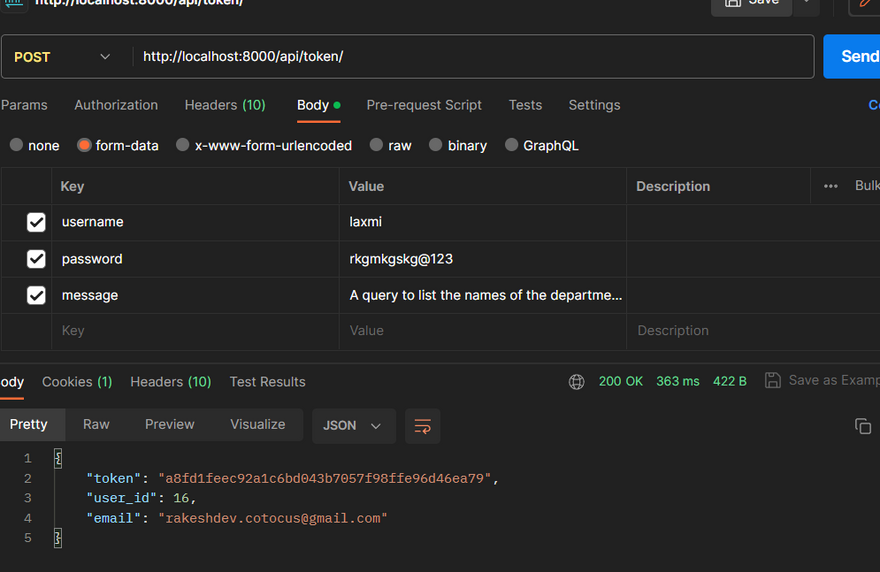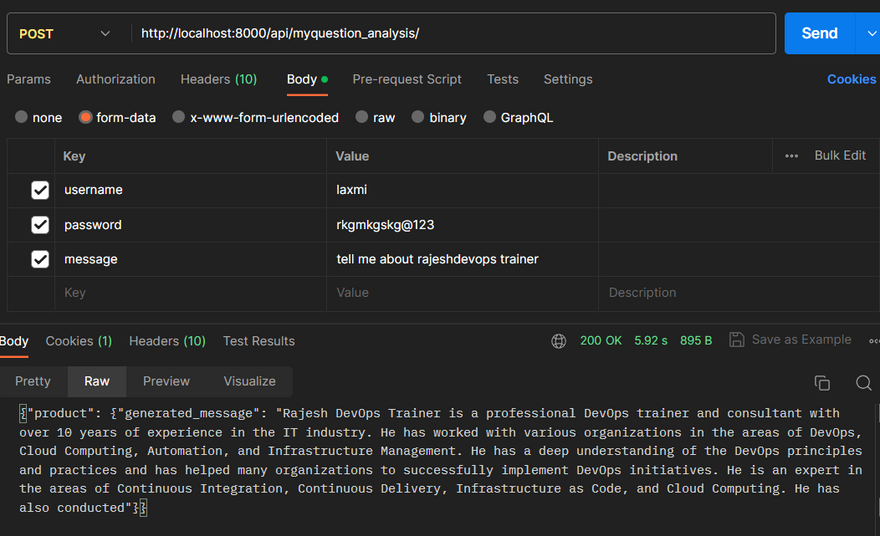Protect Object level or class level api protection
Step 1: install Django Rest Framework, you can use the following command:
$ pip install djangorestframework
Step 2: Update the settings.py file.
INSTALLED_APPS = [
...
'rest_framework',
'rest_framework.authtoken',
]
REST_FRAMEWORK = {
'DEFAULT_AUTHENTICATION_CLASSES': [
'rest_framework.authentication.BasicAuthentication',
'rest_framework.authentication.SessionAuthentication',
],
'DEFAULT_PERMISSION_CLASSES': [
'rest_framework.permissions.IsAuthenticated',
],
}
Step 3: put code in serializers.py.
from rest_framework import serializers
from django.contrib.auth.models import User
from .models import Employee
class UserSerializer(serializers.ModelSerializer):
class Meta:
model = User
fields = ('id', 'username', 'email')
Step 4: create route in settings.py.
from django.contrib import admin
from django.urls import path,include
from myaccount import views
from myaccount.views import ListUsers,CustomAuthToken
from myaccount.views import EmployeeAPIView
urlpatterns = [
path('api/users', ListUsers.as_view()),
path('api/token/', CustomAuthToken.as_view()),
]
Step 4: create function in settings.py.
from django.shortcuts import render
from django.shortcuts import render,HttpResponse,redirect
from rest_framework.views import APIView
from rest_framework.response import Response
from rest_framework import authentication, permissions
from django.contrib.auth.models import User
from django.contrib.auth import authenticate,login,logout
from django.contrib.auth.decorators import login_required
from django.contrib.auth.models import User
from rest_framework.authtoken.views import ObtainAuthToken
from rest_framework.authtoken.models import Token
import requests
from .forms import EmployeeForm
from .models import Employee
from .serializers import EmployeeSerializer
class ListUsers(APIView):
"""
View to list all users in the system.
* Requires token authentication.
* Only admin users are able to access this view.
"""
authentication_classes = [authentication.TokenAuthentication]
permission_classes = [permissions.IsAuthenticated]
def get(self, request, format=None):
"""
Return a list of all users.
"""
usernames = [user.username for user in User.objects.all()]
return Response(usernames)
class CustomAuthToken(ObtainAuthToken):
def post(self, request, *args, **kwargs):
serializer = self.serializer_class(data=request.data,
context={'request': request})
serializer.is_valid(raise_exception=True)
user = serializer.validated_data['user']
token, created = Token.objects.get_or_create(user=user)
return Response({
'token': token.key,
'user_id': user.pk,
'email': user.email
})
Output:
http://localhost:8000/api/token/
http://localhost:8000/api/users/
Protect Function level or Function level api protection
import in view.py
from rest_framework.authtoken.models import Token
from rest_framework.decorators import api_view, permission_classes,authentication_classes
from rest_framework.authentication import TokenAuthentication
from rest_framework.permissions import IsAuthenticated
from django.http import JsonResponse
from django.views.decorators.csrf import csrf_exempt
step2 set route in settings.py
path('api/myquestion_analysis/', views.api_question_analysis, name='api_question_analysis'),
in view.py
@api_view(['POST'])
@authentication_classes([TokenAuthentication])
@permission_classes([IsAuthenticated])
@csrf_exempt
def api_question_analysis(request):
authentication_classes = [authentication.TokenAuthentication]
permission_classes = [permissions.IsAuthenticated]
openai.api_key = settings.OPENAI_API_KEY
message = request.POST.get('message')
response = openai.Completion.create(
engine='text-davinci-003',
prompt=message,
max_tokens=100,
temperature=0,
top_p=1,
frequency_penalty=0,
presence_penalty=0,
)
if response.choices:
print('data 200 choices')
generated_message = response.choices[0].text.strip()
print(generated_message)
else:
print('data else choices')
generated_message = 'Failed to generate response'
category=1
product = ChatMessage.objects.create(message=message, generated_message=generated_message,category_id=category)
data = {'product': {
'generated_message': product.generated_message
}}
return JsonResponse(data)
Output
http://localhost:8000/api/myquestion_analysis/




Top comments (0)